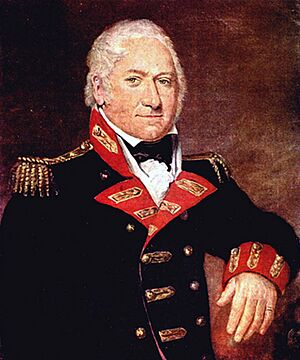Henry Shrapnel facts for kids
Henry Shrapnel (born June 3, 1761 – died March 13, 1842) was a British Army officer. He is well-known for inventing a special type of cannonball. This invention was so important that the word "shrapnel" is now used in the English language. It describes the small pieces that fly out from an exploding shell.
Quick facts for kids
Henry Shrapnel
|
|
|---|---|

Portrait of Shrapnel, 1817
|
|
| Born | 3 June 1761 Bradford on Avon, Wiltshire |
| Died | 13 March 1842 (aged 80) Southampton |
| Allegiance | United Kingdom |
| Service/ |
British Army |
| Rank | Lieutenant-general |
| Unit | Royal Artillery |
| Battles/wars | |
Contents
Who Was Henry Shrapnel?
Henry Shrapnel was born on June 3, 1761. His birthplace was Midway Manor in Bradford-on-Avon, Wiltshire, England. He was the ninth child of Zachariah and Lydia Shrapnel.
His Amazing Invention
While serving as a lieutenant in the Royal Artillery, Henry Shrapnel worked on a new idea. He used his own money to develop a special kind of ammunition. He called it "spherical case" ammunition. This was a hollow cannonball filled with small lead balls. The cannonball was designed to explode in the air. This would scatter the lead balls over a wide area. He successfully showed how it worked in 1787 at Gibraltar. His goal was to create a weapon that could hit many enemy soldiers at once.
How His Invention Was Used
In 1803, the British Army started using a similar type of explosive shell. This new shell was longer than Shrapnel's original design. However, it quickly became known by his name. The term "shrapnel" has been used ever since. It refers to the small pieces that fly off from exploding artillery shells. It also refers to any flying fragments from an explosion. Even after new types of high-explosive shells were invented, the word "shrapnel" stuck. Shells were made using his original ideas until the end of World War I.
His Military Career
Shrapnel served in Flanders, where he was wounded in 1793. He was promoted to major on November 1, 1803. This was after serving eight years as a captain. His invention proved very successful in battle. This happened at Fort Nieuw-Amsterdam in Surinam on April 30, 1804. Because of this success, Shrapnel was promoted again. He became a lieutenant colonel on July 20, 1804. This was less than nine months after his last promotion.
In 1814, the British Government recognized Shrapnel's important contribution. They decided to give him £1,200 a year for the rest of his life. This amount would be worth a lot more money today. However, he faced some problems with paperwork. This prevented him from getting the full amount he was promised. He was appointed to a high position in the Royal Artillery. This happened on March 6, 1827. He reached the rank of lieutenant general on January 10, 1837.
Shrapnel lived at Peartree House in Southampton. He lived there from about 1835 until he passed away.
See also
- List of British generals and brigadiers
- List of English inventors and designers
- 1804 in science
 | Selma Burke |
 | Pauline Powell Burns |
 | Frederick J. Brown |
 | Robert Blackburn |

